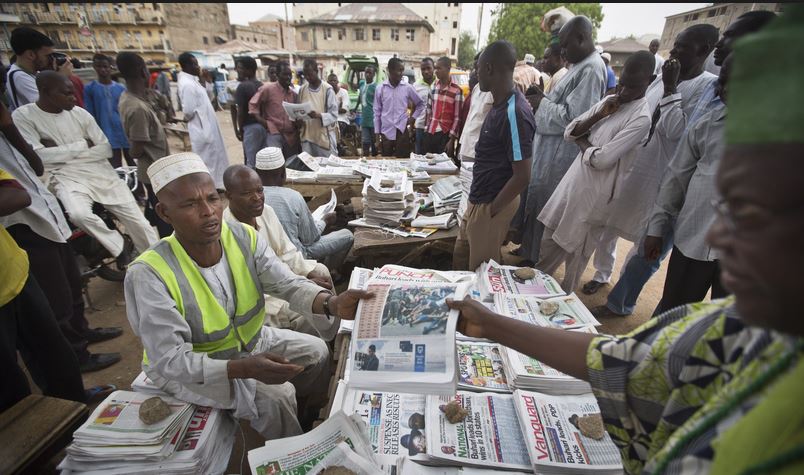The grant of $1billion by Qatar for the provision of scientific equipment for the military and transformation of Nigerian Police training schools and colleges is one of the trending stories in Nigerian newspapers on Thursday.
ThisDay reports that the Republic of Qatar has released $1billion to provide scientific equipment and build an ultra-mordern hospital for officers and men of the Armed Forces including the transformation of Nigerian Police training schools and colleges.
The oil rich nation released the funds through a Non-governmental Organisation (NGO), Africa Global Empowerment and Development Network (AGED-Network).
The organisation, AGED-Network, which signed a Memorandum of Understanding (MoU) with the Rear Admiral Mackson Kadiri-led National Defence College through its Center for Strategic Research and Studies for the advancement of security sector reforms, said it also received a grant of $500 million from its partners, G20 and ASHTROM to build an ultra-modern hospital for officers and men of the armed forces.
Speaking at the opening ceremony of the National Conference on the Roles of Nigeria’s Security Agencies in the Covid-19 Pandemic Environment held at the Sanni Abacha Hall, National Defence College, Abuja, President of the organisation, Dr. Bala Majidadi Kontagora, said one of the organisation’s “major priority is rendering assistance to security agencies by equipping them with mordern scientific equipment.
“We are also embarking on the transformation of the Nigerian Police training schools and colleges with mordern scientific equipment. Our relentless efforts have enabled us to secure $1billion from the government of Qatar”.
He said the state-of-the-art hospital for the personnel of the armed forces would cater for the health needs of officers and their families in Nigeria.
The newspaper says that the International Criminal Police Organisation (INTERPOL) has alerted Nigeria, South Africa, the United Kingdom, the United States, and 190 other countries of threat from organised criminal groups during the upcoming COVID-19 vaccination campaigns, including fake vaccines and the theft of supplies.
The alert came as the UK yesterday became the first country in the world to approve the Pfizer/BioNTech coronavirus vaccine for widespread use.
The need for a vaccine has become more urgent globally and nationally with Nigeria recording over 67,000 COVID-19 infections and over 1,000 associated fatalities, according to the Nigeria Centre for Disease Control.
The World Health Organisation (WHO) has so far identified 49 “candidate vaccines” at the stage of clinical trials in humans.
Hopes are high that shots could be ready for use before the end of the year as two frontrunner vaccines – by Moderna and BioNTech/Pfizer – already reported that phase 3 trials for their mRNA vaccine showed 95 per cent efficacy in preventing Covid-19 symptoms and did not produce adverse side effects among thousands of volunteers.
Interpol, however, observed that there is a rise in the activities of criminals who have started advertising and selling fake COVID-19 vaccines, especially online.
The Punch reports that Nigeria, Africa’s biggest oil producer and exporter, has resumed importation of petrol from China, the world’s top crude oil importer.
The Asian country shipped 37,000 metric tonnes of petrol to Nigeria in September for the first time since July 2019, data from General Administration of Customs showed, according to S&P Global Platts.
China, a major exporter of transportation fuels, has extended exports to Africa in recent years. The first African country to receive Chinese petrol was Togo in April 2018 at 50,000 mt, followed by Nigeria in January 2019 at 51,000 mt, historical GAC data showed.
The most recent diesel exports from China to Africa were in June, with Kenya and South Africa receiving 40,000 mt and 35,000 mt, respectively, according to the data. China’s annual crude oil imports increased by 0.9 million barrels per day in 2019 to an average of 10.1 million bpd, according to the United States Energy Information Administration.
The EIA said China’s new refinery capacity and strategic inventory stockpiling, combined with flat domestic oil production, were the major factors contributing to the increase in its crude oil imports in 2019.
The Sun says that private and commercial motorists have lampooned the Federal Government over its N250,000 demand for conversion of their petrol-powered vehicles to autogas or Compressed Natural Gas (CNG), describing it as outragious.
Justice Derefaka, the Technical Adviser, Gas Business and Policy Implementation, to Minister of State, Petroleum Resources, Timipre Sylva had in a television programme on Wednesday, disclosed that the conversion process will take at least seven hours at the various conversion centres across the country.
His position was, however, at variance from Sylva’s, who in September, promised Nigerians that government would convert the vehicles to run on gas for free to cushion the effects of the hike in pump price of petrol.
But speaking with Daily Sun in Abuja yesterday, a motorist, Emmanuel Adeh, described the conversion process as too expensive and poorly explained.
The Guardian reports that an investment expert and Chief Executive of EFG Hermes Nigeria Limited, Lilian Olubi, has said that rising oil prices would help Nigeria to achieve economic stability.
She, however, said a stable oil market alone would not resolve the country’s economic problems.
Olubi said in an interview that the economy earnestly needed fiscal adjustments that would enable the government to spend more in stimulating the economy.
“We also need to see more liberal policies from the government and easing of import controls in order to boost business activity,” she said.
Speaking on dwindling foreign exchange rates, she said the short-term solution is for authorities to push for a clearing rate that would liberalize the market.
She said: “This can be done with a loan package either from the International Monetary Fund (IMF) or the World Bank that would boost reserves and help authorities to regulate the market.
GIK/APA


